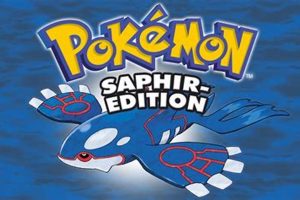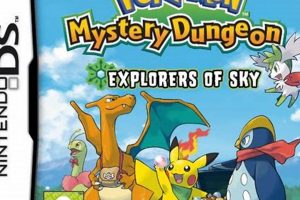Game Boy Advance (GBA) modifications provide altered versions of established titles, specifically within the monster-collecting role-playing game genre. These modifications, frequently created by enthusiasts, introduce alterations to storylines, characters, game mechanics, and visual elements. An instance is a modified version of a flagship title incorporating a new regional map and previously unavailable creatures.
The creation and distribution of modified game versions are driven by a desire for enhanced or novel gaming experiences beyond the original design. These alterations can reinvigorate interest in older platforms and offer gameplay challenges or narratives unavailable through official releases. Their historical development is rooted in the growing accessibility of tools for reverse engineering and game editing, fostering a community dedicated to expanding the lifespan and creative potential of existing game properties.
Subsequent sections will address aspects such as the techniques employed in creating these modified versions, the ethical and legal considerations surrounding their distribution and use, and the impact on the gaming community.
Engaging with modified Game Boy Advance titles requires awareness of best practices to ensure a positive and secure experience. The following guidelines address essential considerations for interacting with these unofficial game versions.
Tip 1: Verify the Source’s Reputation: Prior to downloading a modified version, thoroughly research the source. Reputable websites and communities often provide user reviews and feedback, offering insight into the stability and integrity of the modified game file. This precaution reduces the risk of encountering corrupted files or malicious software.
Tip 2: Employ Anti-Virus Software: Before running a downloaded modified version, scan the file with up-to-date anti-virus software. This action helps detect and neutralize potential malware or viruses that may be bundled with the game file, safeguarding the user’s system.
Tip 3: Utilize a Dedicated Emulator: Employ a Game Boy Advance emulator specifically designed for running modified game files. Some emulators offer enhanced features, such as save state functionality and graphical enhancements, which can improve the overall gaming experience. Ensure the emulator is from a trusted developer to minimize security risks.
Tip 4: Back Up Original Game Files: Before applying any modifications, create a backup of the original game file. This backup allows for restoration to the original game state in case the modified version experiences issues or is not to the user’s liking.
Tip 5: Understand Legal Implications: Be cognizant of the legal implications associated with downloading and playing modified game files. While the legality varies depending on jurisdiction, distributing or profiting from modified versions of copyrighted material may infringe on intellectual property rights.
Tip 6: Exercise Caution with Save Data: Modified versions may introduce save data incompatibility issues with original games or other modified versions. It is advisable to start a new game when using a modification to avoid potential corruption of existing save data.
These guidelines aim to provide a foundation for responsible engagement with modified Game Boy Advance experiences. By adhering to these recommendations, users can mitigate risks and maximize enjoyment.
The subsequent section will explore the potential benefits and drawbacks of engaging with this particular segment of the gaming community.
1. Gameplay Alterations
The modification of established monster-collecting role-playing games on the Game Boy Advance commonly involves substantive alterations to core gameplay mechanics. These adjustments reshape the user experience, offering divergences from the original title’s intended design.
- Increased Difficulty
A prevalent alteration is the introduction of heightened challenge through rebalanced enemy stats, modified encounter rates, and revised AI behavior. This can manifest as opponents with inflated health points, strategically superior move sets, or an increased frequency of rare creature encounters, potentially catering to experienced players seeking a more demanding experience.
- Expanded Creature Roster
Modifications frequently incorporate creatures not originally present in the base game, either through importing assets from other installments in the series or through the creation of entirely new, custom-designed creatures. This expansion broadens strategic options and collection goals, introducing previously unavailable move sets, type combinations, and abilities.
- Adjusted Item Availability and Economy
The distribution and cost of in-game items are often altered. Modifications may make rare or powerful items more accessible, influencing the pace of progression, or they may introduce new items with unique functionalities. Altered shop inventories and revised drop rates can significantly impact resource management and strategic decision-making.
- Revamped Battle Mechanics
Modifications can implement systemic changes to the underlying battle system. This may include altering type effectiveness, introducing new status conditions, or modifying the mechanics of abilities. Such changes can necessitate a reassessment of established strategies and creature selection paradigms.
These alterations collectively contribute to a significantly differentiated user experience within the framework of modified Game Boy Advance titles of this franchise. The alterations are often implemented to address perceived shortcomings in the original game or to provide a novel gameplay experience for dedicated enthusiasts.
2. Story Modifications
Modifications to narrative elements represent a significant facet of custom alterations within monster-collecting role-playing games on the Game Boy Advance. These alterations range from minor dialogue revisions to complete overhauls of the original storyline, impacting player engagement and providing novel experiences.
- Altered Narrative Premise
Modified versions often introduce an entirely new storyline, deviating from the original game’s plot. This may involve a different starting point, a new primary objective, or a reinterpretation of existing lore. For instance, a modification could place the player in the role of a character affiliated with a traditionally antagonistic organization, thereby inverting the conventional protagonist-antagonist dynamic. This can significantly impact the player’s moral alignment within the game world.
- Expanded Character Development
Modifications provide opportunities to elaborate on the background and motivations of existing characters, providing deeper insights into their personalities and relationships. New dialogue sequences, cutscenes, or side quests may be introduced to enhance character depth. A previously minor character could be given a more central role in the narrative, influencing the player’s interaction with the game world.
- Revised Dialogue and Text
Altering the existing text is a common method for modifying the storyline. Dialogue can be rewritten to inject humor, introduce new plot points, or adjust the tone of the game. Grammatical errors present in the original game may also be corrected. More extensive modifications may involve incorporating entirely new text-based events or narratives, delivered through in-game books, documents, or character interactions.
- Incorporation of Mature Themes
Some modifications introduce themes and topics not typically found in the original games, such as moral ambiguity, political intrigue, or philosophical dilemmas. This can alter the overall tone and target audience of the game, potentially appealing to players seeking a more nuanced or mature narrative experience. This often entails the inclusion of darker storylines, complex character motivations, and morally gray choices.
These modifications to the narrative core of established monster-collecting games on the Game Boy Advance contribute to the diversity of available experiences. They offer alternative interpretations of the original game world, providing users with the opportunity to engage with the franchise in unconventional ways.
3. Technical Feasibility
The creation of modified Game Boy Advance titles, specifically within the monster-collecting role-playing game franchise, is fundamentally constrained by technical feasibility. This pertains to the availability of appropriate software tools, the level of technical expertise possessed by the modder, and the inherent limitations of the Game Boy Advance hardware. Without the necessary tools and knowledge, even conceptually innovative alterations remain unrealizable. For example, implementing a wholly new battle system necessitates advanced assembly language programming skills and a deep understanding of the original game’s code structure. The absence of these components renders the alteration impossible.
Technical feasibility dictates the scope and complexity of achievable modifications. Simple modifications, such as altering text strings or re-coloring sprites, require relatively basic tools and skills. However, more ambitious alterations, like adding new regions, creatures, or gameplay mechanics, demand a significantly higher level of technical proficiency and may necessitate the creation of custom software tools. The limitations of the Game Boy Advance hardware also impose constraints. The system’s limited processing power and memory restrict the complexity of new features that can be added without compromising performance. For example, implementing a fully 3D environment would exceed the hardware’s capabilities.
In summary, technical feasibility serves as a critical determinant in the realm of modified Game Boy Advance titles within the specified franchise. It directly influences the range and depth of alterations that can be implemented. The interplay between software availability, modder skill, and hardware limitations ultimately defines the possibilities and boundaries of this creative endeavor. Understanding these technical constraints is essential for both creators and consumers of modified game versions.
4. Legal Implications
The creation, distribution, and use of modified Game Boy Advance titles featuring copyrighted material carry significant legal implications. The extent of these implications varies depending on jurisdiction and the specific nature of the modifications, but they generally revolve around intellectual property rights.
- Copyright Infringement
Copyright law grants exclusive rights to the copyright holder, typically the game developer or publisher, over their creative works. Creating modified versions of these games without permission constitutes copyright infringement. This includes altering game code, characters, storylines, and other copyrighted elements. Distributing or sharing these modifications online further compounds the infringement, potentially leading to legal action from the copyright holder.
- Trademark Violation
Trademarks protect brand names, logos, and other identifiers. Using the trademarked name of a game series (e.g., including the official title) in a modified version, even if distributed for free, can be considered trademark violation. This is because it can create confusion among consumers and dilute the brand’s value. The trademark holder has the right to protect their brand from unauthorized use.
- Distribution of Derivative Works
Modifications are considered derivative works, meaning they are based on the original copyrighted work. Copyright holders possess exclusive rights to create and distribute derivative works. Distributing a modified game without permission is a violation of this right. Even if the modification is transformative (i.e., significantly alters the original work), it still requires permission from the copyright holder to be legally distributed.
- DMCA and Anti-Circumvention
The Digital Millennium Copyright Act (DMCA) in the United States and similar laws in other countries prohibit circumventing technological measures designed to protect copyrighted works. If a game’s code is protected by encryption or other anti-copying measures, breaking these measures to create a modification may be illegal, even if the modification itself does not infringe on copyright.
The legal risks associated with creating, distributing, and using modified game versions should be carefully considered. While some companies may tolerate or even encourage fan-made modifications for non-commercial purposes, others may actively pursue legal action against those who infringe on their intellectual property rights. It is important to research and understand the copyright holder’s policies regarding modifications before engaging in such activities.
5. Community Development
The development of modified Game Boy Advance titles within the specified franchise relies heavily on collaborative efforts within online communities. These communities serve as essential ecosystems for sharing technical knowledge, distributing tools, and disseminating completed modifications. The availability of user-generated resources directly influences the quality and accessibility of such alterations.
Examples of this symbiotic relationship are numerous. Dedicated forums and websites provide centralized locations for developers to share code snippets, tutorials, and debugging assistance. Open-source editing tools, often created and maintained by community members, enable individuals with varying technical skill levels to contribute to the modification process. Furthermore, community feedback plays a crucial role in identifying bugs, refining gameplay mechanics, and ensuring the overall stability of modified game versions. Projects that lack active community support often stagnate due to insufficient resources and quality control. A practical example is the evolution of map editing tools. Early tools were rudimentary, but community-driven development led to sophisticated programs capable of creating entirely new regions, demonstrably enhancing the scope of modifications.
In conclusion, community development is an indispensable component of the modified game scene, particularly within the realm of Game Boy Advance titles of the monster-collecting franchise. Challenges related to quality control, copyright enforcement, and sustainable funding remain, but the collaborative nature of these communities fosters innovation and accessibility. The continued health of this ecosystem is vital for the long-term viability and creative potential of user-generated game modifications.
6. Emulator Compatibility
The successful execution of modified Game Boy Advance titles relies heavily on emulator compatibility. Emulators serve as the software bridge enabling these modifications, often unauthorized versions of copyrighted games, to run on devices other than the original console. Variations in emulator design and functionality directly impact the stability and accuracy of gameplay.
- Core Emulation Accuracy
The core accuracy of an emulator refers to its ability to faithfully replicate the hardware and software environment of the original Game Boy Advance. Discrepancies in emulation can lead to graphical glitches, audio distortions, and even game crashes. Certain modified versions, particularly those employing advanced techniques or custom code, may expose subtle inaccuracies in less precise emulators, rendering them unplayable or unstable. For instance, a modified title utilizing specific memory addresses might function correctly on one emulator but fail on another due to differing memory management implementations.
- Support for Advanced Features
Some modified versions leverage advanced features, such as expanded memory or custom hardware routines, which may not be fully supported by all emulators. Emulators lacking support for these features may exhibit errors or fail to execute specific sections of the modified game. An example includes modifications incorporating custom music tracks exceeding the original game’s audio capabilities; these tracks may play incorrectly or not at all on emulators with limited audio processing capabilities.
- Save State Compatibility
Save state functionality, which allows players to save and load their progress at any point in the game, is a crucial feature for many emulator users. However, compatibility issues can arise between different emulators or even different versions of the same emulator. Save states created in one emulator may be incompatible with another, leading to lost progress or corrupted save data. This is particularly problematic when transferring progress between devices or sharing save states with other players using different emulators.
- Handling of Custom Patches and ROM Formats
Modified titles are often distributed as patches or in non-standard ROM formats. Emulators must be capable of correctly applying these patches and interpreting these formats to ensure the game loads and runs properly. Incompatibility can result in error messages, failed ROM loading, or corrupted game data. Some emulators offer built-in patch application features, while others require the user to manually apply patches using separate tools. Proper handling of these patches and formats is essential for a seamless user experience.
The multifaceted nature of emulator compatibility necessitates careful consideration when engaging with modified game versions. Selecting an emulator known for its accuracy, feature support, and compatibility with custom patches minimizes the risk of encountering technical issues and ensures a more faithful representation of the intended gameplay experience. The interplay between emulator design and the specific features of a modified version ultimately determines the playability and enjoyment derived from such endeavors.
7. File Acquisition
The process of obtaining game files is a foundational element in engaging with modified Game Boy Advance titles within the monster-collecting role-playing game genre. The methods and sources employed in acquiring these files directly influence the user’s experience and legal standing.
- Legitimate ROM Dumps
Acquiring original game files through legitimate means, such as “dumping” a personal copy of the game using appropriate hardware, is a legally defensible position. This practice involves extracting the game data from a physical cartridge owned by the user. The resulting file can then be used in conjunction with emulators or modified versions. Possession of the original game cartridge serves as evidence of ownership, mitigating potential copyright infringement claims.
- Distribution Websites and Forums
Modified versions are frequently disseminated through websites and online forums dedicated to the game modification community. These platforms serve as centralized hubs for sharing game files, patches, and associated resources. However, the legal status of these distributions is often ambiguous, as the sharing of copyrighted game files without authorization constitutes infringement. Users should exercise caution when downloading files from these sources, as the files may contain malicious software or violate copyright laws.
- Peer-to-Peer Networks
Peer-to-peer (P2P) networks, such as BitTorrent, are occasionally used for the distribution of modified game files. This method of distribution carries significant legal risks, as it facilitates the widespread sharing of copyrighted material. Copyright holders actively monitor P2P networks for infringement and may pursue legal action against individuals who download or upload copyrighted files. Furthermore, P2P networks are often associated with the distribution of malware, increasing the risk of infection.
- Pre-Patched ROMs
Some sources offer pre-patched ROM files, where modifications have already been applied to the original game data. While convenient, obtaining pre-patched ROMs carries the same legal risks as downloading original game files from unauthorized sources. The distribution of pre-patched ROMs without permission constitutes copyright infringement. Users should consider patching their own legally obtained ROM dumps to minimize legal risks.
The acquisition of game files is a crucial consideration in the realm of modified game versions within this specific game franchise on Game Boy Advance (GBA). Users must be cognizant of the legal and security implications associated with different acquisition methods. Adherence to responsible file acquisition practices, such as dumping personally owned games, can mitigate legal risks and enhance the overall user experience.
Frequently Asked Questions
The following section addresses common inquiries regarding modified Game Boy Advance titles. This information is presented to provide clarity and promote responsible engagement with these unofficial game versions.
Question 1: What defines a modified Game Boy Advance title?
A modified title refers to a version of an established game that has been altered by individuals or groups. These alterations may encompass changes to the storyline, character attributes, game mechanics, or visual elements.
Question 2: Is the creation and distribution of modified game versions legal?
The legality of creating and distributing these versions is contingent upon copyright law. Unauthorized modification and distribution of copyrighted material may constitute infringement and subject the responsible parties to legal action.
Question 3: What are the potential risks associated with downloading these modified files?
Downloading modified game files from untrusted sources poses risks, including exposure to malware, corrupted game data, and potential legal repercussions resulting from copyright infringement.
Question 4: What technical skills are required to create a modified game version?
Creating a modified game version often necessitates a range of technical skills, including proficiency in programming languages, familiarity with game editing tools, and a thorough understanding of the Game Boy Advance hardware architecture.
Question 5: Do modified versions require specific emulator software?
While many emulators are compatible with modified versions, certain modifications may require specific emulator features or versions to function correctly. Emulator compatibility information is typically provided by the modification creator.
Question 6: Can progress from original games be transferred to modified versions?
Save data compatibility between original games and modified versions is not guaranteed. Modifications may alter data structures, rendering existing save files incompatible and potentially corrupting game data.
In summary, engaging with modified versions requires a degree of technical understanding and awareness of potential legal and security risks. Users are advised to exercise caution and adhere to responsible file acquisition practices.
The subsequent section will discuss responsible gaming guidelines to promote responsible engagement in this activity.
Concluding Remarks on Modified Game Boy Advance Titles Within the Monster-Collecting Franchise
This exploration has elucidated the complex landscape surrounding modified Game Boy Advance titles centered around a specific monster-collecting franchise. Key considerations encompass technical feasibility, legal ramifications, the role of community development, emulator compatibility, and responsible file acquisition practices. The modifications introduce alterations to gameplay, narrative, and overall user experience, offering potentially enhanced or diversified gaming scenarios. However, the importance of ethical and legal considerations cannot be overstated. Copyright infringement, security risks associated with file downloads, and the potential for corrupted game data represent significant concerns that warrant careful attention.
The phenomenon of modified Game Boy Advance experiences represents a complex intersection of creativity, technical skill, and legal boundaries. Continued engagement with these unofficial versions necessitates a balanced approach, acknowledging both the potential for innovation and the importance of respecting intellectual property rights. As technology evolves, the landscape of game modification will undoubtedly continue to evolve as well, requiring ongoing vigilance and a commitment to responsible practices. The onus remains on users to navigate this space ethically and legally, ensuring that the pursuit of novel gaming experiences does not infringe upon the rights of creators.







